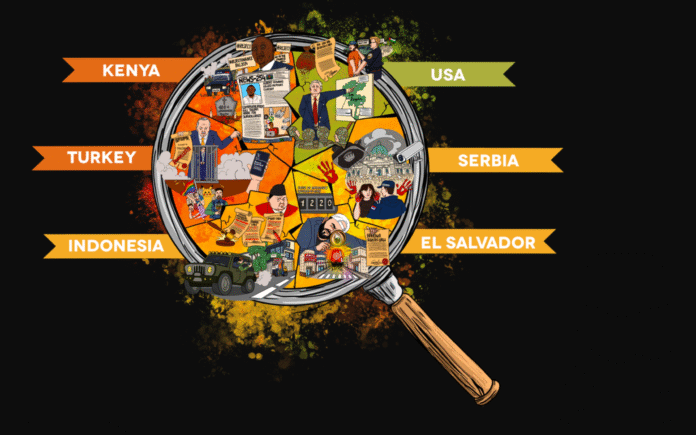The international civil society alliance CIVICUS has added Turkey to its July Monitor Watchlist, warning of a sharp deterioration in civil liberties following a wave of protests, arrests and political repression targeting opposition figures, journalists and minority communities, Euronews Turkish service reported.
In a statement released Wednesday, CIVICUS said Turkey now falls under its second-worst category of “repressed,” meaning fundamental rights such as freedom of expression as well as the right to peaceful assembly and association are seriously curtailed. Only countries classified as “closed” rank lower.
Turkey joins a list of 51 countries in the “repressed” category, including Serbia, Indonesia, Kenya and El Salvador. CIVICUS categorizes countries under five levels of civic space: open, narrowed, obstructed, repressed and closed.
CIVICUS is a Johannesburg-based global alliance of civil society organizations advocating for democratic freedoms and civic space. Its watchlist indicates countries where there is a rapid decline in rights or an urgent need for international attention.
The warning comes amid growing concern over the political crackdown that escalated after the arrest of Istanbul’s mayor, Ekrem İmamoğlu, a prominent opposition figure from the main opposition Republican People’s Party (CHP) and the party’s presidential candidate for the next election. İmamoğlu is currently behind bars.
The mayor, seen as the strongest political rival of President Recep Tayyip Erdoğan, was arrested on March 23 on corruption charges, widely seen as politically motivated. His detention on March 19 led to widespread protests unseen in Turkey, since the anti-government protests of 2013. The protests were met with heavy-handed police force, including tear gas and plastic bullets.
CIVICUS also noted a growing number of political arrests targeting opposition-run municipalities. The CHP has been under a harsh crackdown for about a year that has so far led to the arrest of 17 CHP mayors and dozens of party officials.
In March, a series of coordinated dawn raids led to the detention of 11 journalists. BBC’s Turkey correspondent Mark Lowen was deported, and Swedish journalist Joakim Medin was detained on March 27 upon arrival at İstanbul Airport. He had travelled to Turkey to cover demonstrations following the March 19 detention of İstanbul Mayor İmamoğlu. Medin was subsequently arrested and charged with insulting the president and with alleged links to a terrorist organization. He received an 11-month suspended sentence and was released on May 16.
Tara Petrovic, a CIVICUS researcher for Europe and Central Asia, said the actions of Turkish authorities amounted to political purges. “The government is dismantling democratic opposition ahead of the next elections, using violence and other blatantly unlawful tools to silence any perceived dissent,” she said.
Authorities also ramped up repression of LGBTQI+ activism. For the first time, three people were arrested for participating in the annual Istanbul Pride March in June. A total of 52 individuals, including activists, lawyers and journalists, were reportedly detained without clear legal grounds.
Beyond the streets, Turkish authorities are also tightening control over the media and online expression. CIVICUS Monitor’s lead researcher, Ine Van Severen, said the government is “not content to silence the streets; they are censoring journalists and crushing digital dissent as well.”
Veteran journalist Fatih Altaylı was jailed in July over remarks made on his YouTube channel, accused of “threatening the president.”
Turkey ranks 158th out of 180 countries on the World Press Freedom Index compiled by Reporters Without Borders.
Turkey’s classification reflects a broader warning about the erosion of civil liberties worldwide, the organization said, particularly in countries facing authoritarian drift under the guise of political stability or national security.















